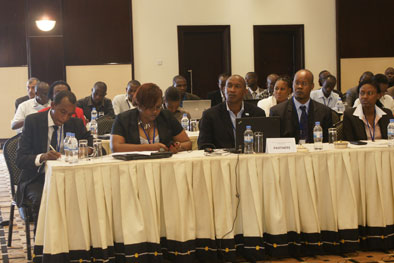The conference which had brought together over 200 youth from 15 African countries resolved to take up “a more visible, active and meaningful role in addressing climate change and water resources management challenges.”
Participating institution included Ministry of Natural Resources and Environment (Rwanda) GWP Eastern Africa, International Water Association, Africa Water Association (AWA), African Ministers’ Council on Water (AMCOW), East African Young Water Professionals, Department of Water Affairs, South Africa, Water Aid among others.
Through a presentation themed “Increasing Resilience to Climate Change: What is the Role of the Youth?” GWP Eastern Africa used the platform to showcase Global Water Partnership’s philosophy, its current drive to mobilize collective efforts towards climate change adaptation mechanisms and the role youth can play in lessening climate change effects in Eastern Africa.
Along with other actors, GWP Eastern Africa co-organized, co-financed and facilitated the conference themed “Water for the Future: A contribution of the Youth.”
As future leaders, creative, largest and fastest growing proportion of the Africa’s population, the youth further committed themselves to “fully take charge of water management challenges and solutions,” reads the declaration of the 2nd East Africa Young Water Professionals Conference.
GWP Eastern Africa recognizes that the youth as Africa’s next decision-makers are key stakeholders in understanding linkages between climate change and sustainable water resources management.
The youth resolved to direct their youthful energies towards dealing with climate change issues. Due to climate change, the Greater Horn of Africa has experienced severe shortage of water, erratic floods, and changing rainfall seasons.
From a GWP Eastern perspective, “one key outcome of the conference achieved was that at least 200 of a specific category of African population, next future leaders and actors from over 15 African countries and beyond fully understood their expected roles in addressing climate change challenges and how it impacts on water resources management.”
Basing on their capacity to stimulate sustainable change in climate change and its negative effects on water, GWP Eastern Africa urged participating young water professionals not only adopt a water declaration, but as Africa’s upcoming leaders, they practically engage African decision-makers to adopt water and climate friendly policies and strategies.
Rwanda’s Minister of the National Resources and Environment, Stanslas Kamanzi pledged the continued support for youth initiatives in managing water resources and climate change.
“Worldwide, the Youth have come up with innovations that have contributed to drastically changing the social environment they live in. The African Youth is certainly on the right path in this regard.”
The conference attracted high level decision-makers from Eastern African Members countries also underlined the need for youth to take urgent measures and prudent care for water and climate issues to guard against generational consequences.
Participants also emphasized the need for increased exchange of scientific knowledge and water resource management and climate change adaptation best practices especially in water stressed countries.
Motivated to build a future with minimal climatic and water related hazards, the Kigali Declaration drew 5 guiding principles; the 4th principle committed the youth to conduct mass education of citizens to create an understanding of the magnitude of the water sector challenges that face Africa in the near and distant future.
The Ministry of Natural Resources Rwanda: keynote address delivered at the conference
